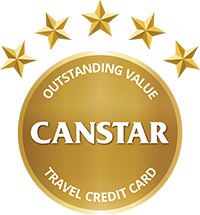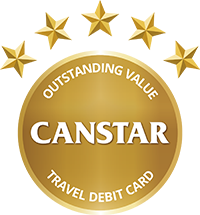Travel Credit & Debit cards
Aussies love to holiday overseas and many of us take our credit or debit cards along to help pay for the fun. Working out the fees and charges that could apply when you use your credit card or debit card overseas can be complex, and currency conversion and ATM fees can really add up if you don’t have a strategy in place to avoid or minimise them.
Check out our tips on how to save money when travelling, and view the award winners of our Travel Credit & Debit Card Star Ratings.
What are travel credit cards and debit cards?


Travel credit and debit cards are two popular ways to spend money overseas. They can be used as an alternative to cash and allow you to make purchases and withdraw cash when travelling abroad.
Travel credit cards work like regular credit cards but they may come with added benefits. Common examples include no or low currency conversion fees and overseas ATM fees, and perks like reward points, travel insurance and airport lounge access.
A travel debit card is a regular debit card that you can use overseas. These cards are attached to a transaction account, so you are spending your own money rather than borrowing money from the bank. Like travel credit cards, you can also get travel debit cards with no or low currency conversion and overseas ATM fees.
The features on offer and the costs involved will depend on the card in question, so it’s important to compare individual options carefully. As with other travel money options, there are also various pros and cons to weigh up.
How do Canstar’s Travel Credit & Debit Cards Star Ratings work?
Canstar considers over 200 travel credit and debit cards from different banks and financial institutions. Our expert researchers use a sophisticated methodology to rank accounts, with a particular focus on features and fees for owning and using the card. Canstar gives the top-performing cards a 5-Star Rating.
Canstar’s Star Ratings do not focus on the cost of financing an overseas trip. Credit cards can be an extremely expensive way to finance a holiday if your spending is not paid off within the interest-free period, particularly if the provider charges high fees as well.
Some of the factors we consider for travel credit and debit cards include:
- Fees – currency conversion fees and overseas ATM fees, as well as ongoing account-keeping fees, annual fees and any fee waivers
- How easy it is to use the card and manage your account – including the ability to make international purchases, international ATM access, cash advances for credit cards, and merchant acceptability
- Rewards for travel credit cards – some cards allow you to earn reward or frequent flyer points for your spending, which could help offset any annual fees
- Premium travel features for travel credit cards – common examples include travel insurance and access to airport lounges.
About our finance experts
Nina Rinella, Editor-in-Chief
As Canstar’s Editor-in-Chief, Nina heads up a team of talented journalists committed to helping empower consumers to take greater control of their finances. Previously Nina founded her own agency where she provided content and communications support to clients around Australia for eight years. She also spent four years as the PR Manager for American Express Australia, and has worked at a Brisbane communications agency where she supported dozens of clients, including Sunsuper and Suncorp.
Nina has ghostwritten dozens of opinion pieces for publications including The Australian and has been interviewed on finance topics by the Herald Sun and the Sydney Morning Herald. When she’s not dreaming up ways to put a fresh spin on finance, she’s taking her own advice by trying to pay her house off as quickly as possible and raising two money-savvy kids.
Nina has a Bachelor of Journalism and a Bachelor of Arts with a double major in English Literature from the University of Queensland. She’s also an experienced presenter, and has hosted numerous events and YouTube series.
You can follow her on Instagram or Twitter, or Canstar on Facebook.
You can also read more about Canstar’s editorial team and our robust fact-checking process.
Josh Sale, Travel Credit and Debit Card Ratings Manager
 As Canstar’s Ratings Manager, Josh Sale is responsible for the methodology and delivery of Canstar’s Travel Credit and Debit Card Star Ratings. With tertiary qualifications in economics and finance, Josh has worked behind the scenes for the last five years to develop Star Ratings and Awards that help connect consumers with the right product for them.
As Canstar’s Ratings Manager, Josh Sale is responsible for the methodology and delivery of Canstar’s Travel Credit and Debit Card Star Ratings. With tertiary qualifications in economics and finance, Josh has worked behind the scenes for the last five years to develop Star Ratings and Awards that help connect consumers with the right product for them.
Josh is passionate about helping consumers get hands-on with their finances. Josh has been interviewed by media outlets such as the Australian Financial Review, news.com.au and Money Magazine.
You can follow Josh on LinkedIn, and Canstar on Twitter and Facebook.
This content was reviewed by Deputy Editor Sean Callery and Sub-Editor Tom Letts as part of our fact-checking process.
Important information
For those that love the detail
This advice is general and has not taken into account your objectives, financial situation or needs. Consider whether this advice is right for you.












